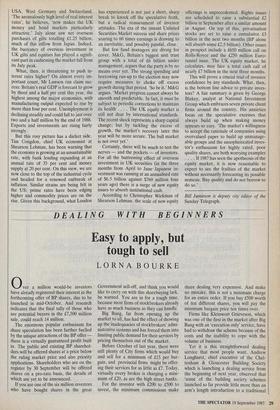DEALING WITH BEGINNERS
Easy to apply, but tough to sell
LORNA BOURKE
Over a million would-be investors have already registered their interest in the forthcoming offer of BP shares, due, to be launched in mid-October. And research indicates that the final tally of those who are potential buyers in the £7,500 million sale, could reach 14 million.
The enormous pOpular enthusiasm for share speculation has been further fuelled by the unique attractions of the BP offer there is a virtually guaranteed profit built in. The public and existing BP sharehol- ders will be offered shares at a price below the ruling market price and also priority applications. Shareholders who are on the register by 30 September will be offered shares on a pro-rata basis, the details of which are yet to be announced.
If you are one of the six million investors who have bought shares in the great Government sell-off, and think you would like to carry on with this sharebuying lark, be warned. You are in for a tough time, because most firms of stockbrokers already have as much business as they can handle.
Big Bang, far from opening up the market to all, has had the effect of showing up the inadequacies of stockbrokers' admi- nistrative systems and has forced them into limiting public demand for their services by pricing themselves, out of the market.
Before October of last year, there were still plenty of City firms which would buy and sell for a minimum of £15 per bar- gain, and provincial firms might be offer- ing their services for as little as £7. Today, virtually every broker is charging a mini- mum of £20, as are the high street banks.
For the investor with £200 to £500 to invest, the minimum commissions make share dealing very expensive. And make no mistake, this is not a minimum charge for an entire order. If you buy £500 worth of ten different shares, you will pay the minimum bargain price ten times over.
Firms like Kleinwort Grieveson, which was one of the first in the market after Big Bang with an 'execution only' service, have had to withdraw the scheme because of the costs and the inability to cope with the volume of business.
Yet it is this straightforward dealing service that most people want. Andrew Longhurst, chief executive of the Chel- tenham & Gloucester Building Society which is launching a dealing service from the beginning of next year, observed that `some of the building society schemes launched so far provide little more than an arm's length introduction to a traditional stockbroking service. This is not what our customers are telling us they want.'
Realistically, the investor who enjoys the excitement of a flutter in shares — but cannot afford to trade in much more than £500 to £1,000 a time—will have to go to a provincial broker, use one of the high street banks' dealing services, or hang on until the C & G launches its scheme because the big City stockbrokers will not be interested in his becoming a client unless he has at least £100,000 to invest. Even then, firms like Kleinwort Grieveson will put you into unit trusts rather than individual shares, while Mercury Rowan Mullens will let you have individual shares only if you have at least £300,000 to invest.
The big private client firms like Quilter Goodison, Capel-Cure Myers, Buckmaster & Moore, Laing & Cruickshank, Shep- pards, James Capel and Scrimgeour Vick- ers, do not want you ringing them up with buy or sell orders for £1,000 worth of BP or ICI. They want you to be a 'discretionary client' which means that they manage your investments for you along with all the other private clients, sending a report every half year on what they have bought and sold on your behalf. If you have over £250,000 they might just tolerate your being an `advisory' client, which means that they write to you with their recommendations and you can then ring up and say yes — or no.
The drawback with the bank and build- ing society schemes is obvious. Although they offer a straightforward dealing ser- vice, in order to execute your order they
have to go through a stockbroker.
In the case of the banks, this will be 'in house'. But they either 'bundle' — lump together a number of small orders in order to get the economies of scale — in which case you may deal at nothing like the price you expected, or they put through the orders as they come, and have almost the same difficulty as the individual in getting the broker interested in such a little deal.
All the banks now charge £20 minimum commission. Norwich & Peterborough Building Society, which has a link up with local stockbrokers Barratt and Cooke and Walter Lunniss, will buy and sell for you for £15. Bristol & West has a sharedealing service as does National & Provincial.
Probably the best option for the person who wants to manage his or her own portfolio of shares is to go to a good provincial firm like Manchester-based Henry Cooke Lumsden, Heseltine Moss which has branches in most large towns, or a firm in the Allied Provincial stable Parson's and Co, lllingworth & Henriques for example. Minimum bargain charges in the Allied Provincial group are £15 buying, £10 selling. The Stock Exchange will pro- vide a list of good provincial brokers.
Henry Cooke Lumsden, in particular, has a good track record on the investment side for those who prefer a discretionary or advisory portfolio management service and there is no minimum portfolio size. Hesel- tine Moss has a minimum bargain charge of £15 and a minimum of £20,000 for both advisory and discretionary clients. If you are a larger client with, say, £200,000 and want a discretionary service, the only way of judging the brokers' investment track record is to take a look at the performance of the in-house unit trusts run by most stockbrokers who have signifi- cant private client business. With most of the larger firms of City brokers, this is what you will be put into anyway — although some like Hoare Govett do offer a unit trust advisory service which looks at all the 1,100 unit trusts on offer.
On this front, Buckmaster & Moore have done well with their Smaller Com- panies Trust which is up nearly 100 per cent on the past year and number six among UK growth funds. And the Barring- ton funds run by Kleinwort Grieveson have done reasonably well right across the board. The really big investors — anyone with a million or more — should consider splitting a portfolio between two brokers and comparing their performance over, say, a three-year period.
Beginners still not quite clear what it is all about and where to go can get hold of the Consumers' Association Shares Action Kit which contains a useful stockbrokers' directory setting out charges and services offered by most of the firms. It is available, price £5.95, from the Subscription Depart- ment, Consumers' Association, PO Box 44, Hertford SG14 1SH.
Lorna Bourke is personal finance editor of the Independent.



































































 Previous page
Previous page